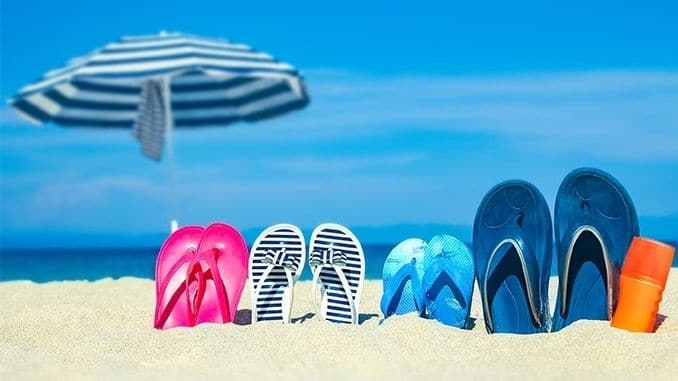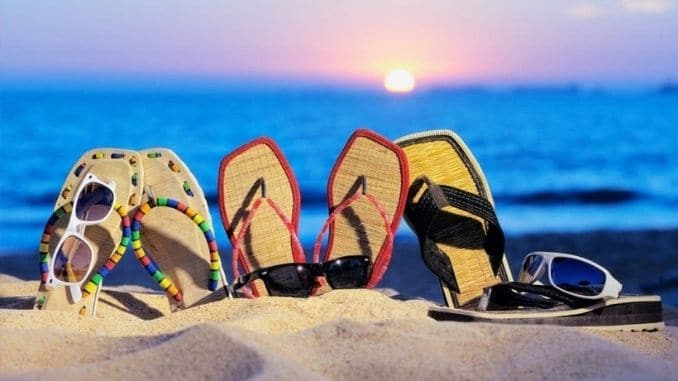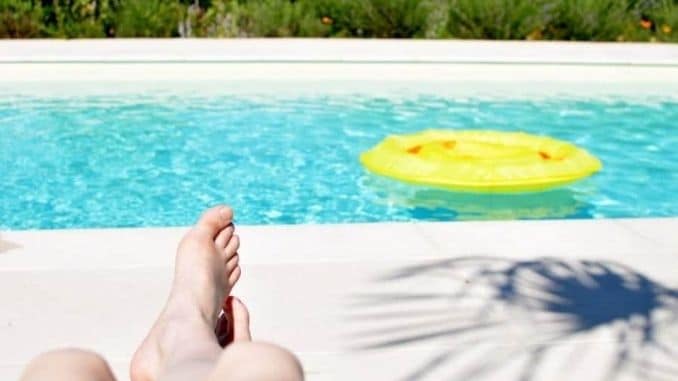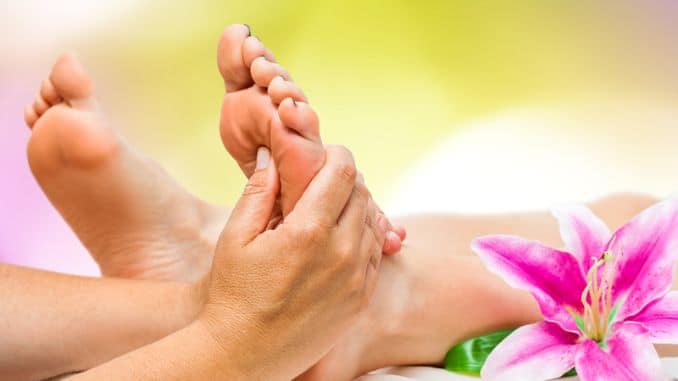
Summertime is all about Feet Happy and Healthy During Summer, sandals, flip-flops, and showing off the tootsies in the best way possible. It means fewer socks, covered shoes, and more naked feet digging into soft sand and splashing in the water. We all love summer and the comfort of not having to cover up to stay warm. However, we’ve likely neglected our feet after a long winter, and diving straight into summer footwear can do more harm than good.
Did you know that your feet have more than 250,000 sweat glands? That’s a lot of sweat-producing potential, especially when they’ve been hidden away from sight during the year’s cold months.
Surprisingly, it’s not the sweat glands that produce the stench that sometimes comes from your feet when you’ve taken them out of the shoes from a long day at work. Instead, it’s bacteria that lead to fungal infections that cause bad foot odors to occur. Neglected feet can result in cracked heels, corns, and callouses, the last thing you want to see when you strap on a pair of summer shoes.
The Good, the Bad & the Ugly
Plantar fasciitis is a common ailment that can occur when our feet lack the needed support from shoes. You could end up with a sharp, burning pain in your heel that can damage your gait and stride and keep you off your feet for most of the summer. The biggest cause is unsupported shoes, and often that is summer footwear. Summer footwear is awesome for warm days and balmy nights, but it can cause havoc with the health of your feet.
Feet Happy and Healthy During Summer
- Sandals that strap above the heel are going to do the least amount of damage. You want support around your heels to avoid injury and pain. Completely flat shoes aren’t good, either. A slight to moderate heel is best. If you’ve got a strap, go for something that isn’t spaghetti. As it will not give you the support you need.
- Flip-flops aren’t meant for long-term wear. Flip-flops were created as “around-the-pool” attire, not as shoes to be worn on strolls and shopping sprees, as they are often seen in summer. Flip-flops provide zero support. Which means your heel is flopping up and down and waiting to be sent to the emergency room with pain.
- Ballet flats are also popular in the summer, but they aren’t the most supportive shoes. Often, they are very thin around the sole and can cause foot pain from long-time wear. Our feet weren’t meant to be scrunched up at the front of the shoe, which is how most ballet flats are designed.
Often, fashion leads us to make unhealthy choices for our feet. That doesn’t mean we should hang up all our pretty shoes and resolve to wear “old lady” shoes. It comes down to moderation. We wear different types of footwear for different occasions and ensure that we purchase supportive shoes, regardless of the summer weather.
How to Get Gorgeous-Looking Feet for Summer?
Our feet are probably the most neglected parts of our bodies, yet they are the most used. With your feet out for show for most of the summer, you want your feet to look their best. After hibernating in socks, boots, and covered shoes for a good portion of the year, your feet might need tender, loving care before they face the world.
You can do a few things to bring your feet back to good form.
1. Invest in a Good Foot Scrub
Did you know that our feet are the most neglected body part? They are, and yet they do most of the work for us all day. We use them from the moment we get out of bed to the moment we jump back into bed, and if they’re lucky to get eight hours of rest, that’s still not enough.
Be kind to your feet, and they will look after you for a long time. Feet Happy and Healthy During Summer.
Buy a good foot scrub and scrub your toes and your soles. Get rid of the dead skin cells and have your feet looking fantastic. You can do this easily in the shower several times per week.
2. Sleep in Your Socks
You’ve probably done this for most of the winter to stay warm, as the feet are the first to feel the cold. But did you remember to moisturize? No surprise there.
Here’s what you can do. After your evening shower, rub some moisturizer on your feet. Work it into the heels, over your soles, and around your toes. Then, slip your feet into some comfortable socks. In the morning, your feet might not be as good as new, at least not right away, but they will be softer to the touch and much better looking. Keep it up for a week, and you’ll notice a significant improvement.
3. Treat Your Feet to Regular Pedicures
Pedicures are great, especially if someone is doing them for you. However, if you’re not keen on a stranger massaging your feet and peeling away the yucky winter coat that’s grown over your heels, then you can give yourself a pedicure easily in the comfort and privacy of your bathroom.
Grab a large bowl or dishpan, fill it with water, add some Epsom salts or table salt, add some body wash or soap, and soak your feet for 10 or 15 minutes. Once your feet have had a good soak and are feeling softer, pat them dry and cut your toenails, clean underneath them, cut away flaky skin, and give yourself a nice little massage. You deserve it.
4. Visit the Podiatrist
We could all use a podiatrist from time to time. Women are especially prone to foot problems due to the high-heeled shoes they wear daily all year round. High-heeled shoes rarely offer the right support and are one of the leading causes of foot problems.
Get a podiatrist to check out your stride and advise you on the best type of shoes for your feet or exercise you can do to improve the way you move.
You should seek a podiatrist if you:
-
- Feel pain
- Have chronic discomfort
- Experience inflammation of the foot
A good podiatrist will help you find shoes that provide good arch support, cushioning for the heel and proper shock absorption. However, remember, prevention is always better than a cure.
Takeaways
Our feet have tackled around 75,000 miles by the time we reach middle age. If you’re a runner or more active than the average, that mileage is likely to be significantly higher, meaning more strain and pressure on your feet.
The best way to avoid foot pain is to find the right shoes and change the shoes you regularly wear so that your feet never get used to one type of shoe. This will prevent overuse injuries, blisters, callouses, and all the other nasties that might otherwise arise.
Take care!
Rick Kaselj, MS
If you want to learn how to treat and beat plantar fasciitis in 90 seconds, click here to check out the Plantar Fasciitis Relief in 7 Days program.





